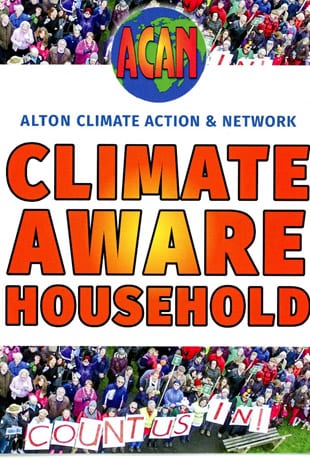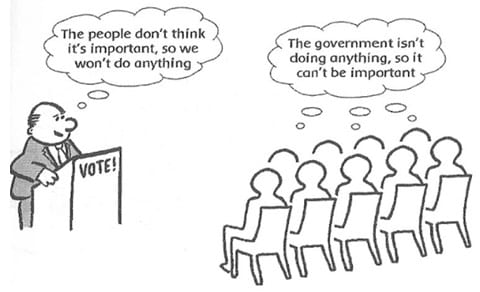Tackling the climate emergency
The world scientists’ warning of a climate emergency (Ripple et al, November 2019) stated, “The climate crisis is closely linked to the excessive consumption of the wealthy lifestyle.”
The scientists set out a series of urgently needed actions:
- Use energy far more efficiently and apply strong carbon taxes to cut fossil fuel use
- Stabilise global population – currently growing by 200,000 people a day – using ethical approaches such as longer education for girls
- End the destruction of nature and restore forests and mangroves to absorb carbon dioxide (CO2)
- Eat mostly plants and less meat, and reduce food waste
- Shift economic goals away from GDP growth
“The good news is that such transformative change, with social and economic justice for all, promises far greater human well-being than does business as usual,” the scientists said. See this website’s Towards a Better Future section.
What’s the point? Why bother?
The world scientists (see above) note that “greenhouse gas (GHG) emissions are still rapidly rising” in some countries. Radical action by people in the UK can feel pointless. ACAN believes there are three reasons why we MUST all take action and urge our government to do so:
- The climate emergency (and the destruction of nature) are so serious that it behoves each and every one of us and all governments to take action
- Great Britain led the world into the fossil-fuelled industrial revolution in the 19th century and we can and should lead the world into a post-carbon society in the 21st century – it is arguably a moral imperative
- As the world scientists stress, the changes we need to make will improve our lives: they will reduce social and health inequalities, strengthen communities, and increase personal health and well-being.
“Local Can Lead”
ACAN believes that local communities must lead. We cannot wait passively. For an inspiring response to the Climate Emergency Challenge, see Oxford Friends of the Earth’s Fast Forward Oxfordshire or visit their website.
Become a climate aware household
We can individually and together do much to reduce our greenhouse gas emissions, influence public opinion and encourage action by government:

- You and your family can take action to reduce your own carbon emissions – see our 10 suggestions.
- Join one of ACAN’s groups to implement ideas with other local people to reduce greenhouse gas emissions – it’s enjoyable and interesting. Alton Repair Café and the Community Food Cupboard are two projects that local people have developed.
- Talk with your family, friends and neighbours about the climate emergency and all the positive action we can take. Use the information on this website to challenge those who deny the evidence. It’s important to influence public opinion. If enough people demand action, the government will take action.
- Press for urgent and radical action by government at all levels, especially to improve public transport and reduce carbon emissions from buildings old and new. You could join ACAN’s Lobbying and Campaigning Group, which influences and supports Alton Town Council, East Hampshire District Council, Hampshire County Council and our MP, through meetings, emails, letters, and by supporting those who wish to participate in demonstrations.

We need government to:
- Give us the information and help we need to reduce our carbon emissions
- Prioritise environmental standards in the UK and in trade deals with other countries
- Invest urgently in improved public transport and energy-efficient housing
- Use tax and other financial incentives to help us reduce environmental damage
Reducing our own and our family’s carbon emissions
There are many different estimates and calculations of personal and household carbon emissions (or, more accurately, greenhouse gas emissions (GHGs), including methane and nitrous oxide).
Very approximately, the following four areas of our lives account for roughly 25% each of emissions:
- FOOD [learn more about reducing GHGs by changing what we eat, and look at the BBC’s food calculator (this has lots of interesting information on carbon emissions from different foods)]
- ENERGY IN THE HOME
- TRANSPORT (including flying)
- CONSUMING GOODS AND SERVICES – especially shopping!
If you are able to do so, planting a tree or two or native hedging, and generally growing plants (especially pollinator-friendly plants) will help to absorb (“sequester”) carbon.
 Alton Climate Action Network
Alton Climate Action Network